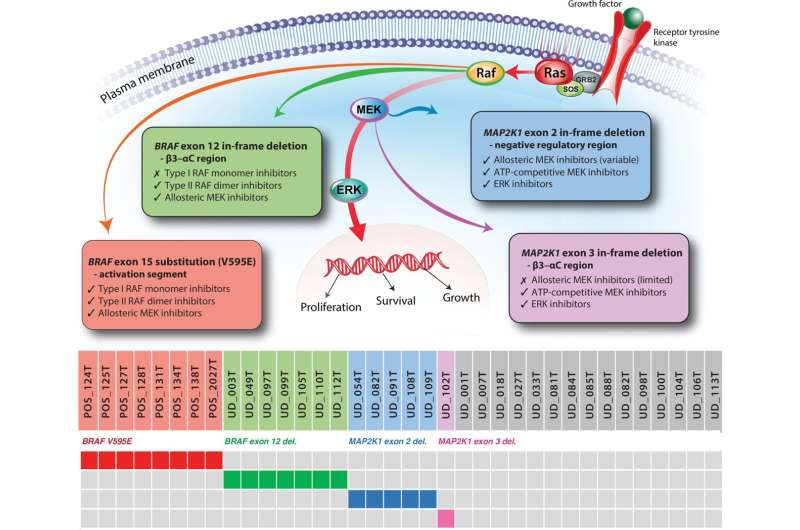Researchers identify a new genetic culprit in canine bladder cancers

Researchers have identified new genetic mutations linked to a subset of canine bladder cancers. Their findings have implications both for early cancer detection and for targeted treatments in dogs and humans. The study is published in the journal PLOS Genetics.
Previous research showed that 85% of canine urothelial carcinomas (a type of bladder cancer) share a specific mutation in a gene named BRAF. This mutation (known as V595E) is caused by an error in BRAF’s genetic code, where a normal “T” nucleotide in the DNA sequence is substituted by an “A.” The BRAF V595E mutation results in abnormal activation of a genetic signaling pathway called MAPK, leading to uncontrolled cellular growth, or proliferation.
“Essentially, BRAF V595E generates an abnormal protein that instructs the cells to keep dividing, forming a tumor. So if this single nucleotide substitution in the BRAF gene is detected in 85% of all canine urothelial carcinomas, why is it not in all of them?” asks Matthew Breen, Oscar J. Fletcher Distinguished Professor of Comparative Oncology Genetics at North Carolina State University and corresponding author of the research. “Pathologists see no difference between those cancers with this mutation and those without, so what’s going on with that other 15%?”
The research team studied 28 canine urothelial carcinomas without the BRAF V595E nucleotide substitution, hoping to identify other DNA sequence mutations that may cause these tumors. The team found that 13 of the 28 cases (46%) had a different type of mutation, where a small number of nucleotides had been deleted, like missing words in a sentence. These deletion mutations occurred either elsewhere in the BRAF gene, or in MAP2K1, another important gene within the MAPK pathway.
“This work identified mutations in approximately half of the 15% of canine urothelial carcinomas that don’t have the BRAF V595E mutation,” says Rachael Thomas, lead author of the study. “Evidence from human cancers suggests that these deletions would generate abnormal proteins that can initiate uncontrolled cellular proliferation and result in a tumor—essentially the same end result as V595E. We have developed a laboratory assay that can simultaneously detect both the substitution and deletion mutations, to expand our opportunity for early detection of these cancers in dogs.”
But that’s not the only bit of good news. Knowing which mutations are involved in a cancer could lead to more precise, and more effective, treatment.
“We know, for example, that in people with cancers that have a BRAF V600E mutation (the human equivalent of the canine V595E mutation), certain categories of therapeutic drugs are more effective than others,” Breen says. “And human cancers with the corresponding deletion mutations in BRAF and MAP2K1 are more susceptible to a different therapeutic class. So being able to differentiate canine cancers based on their underlying genetic changes may allow us to consider selection of the most appropriate medicine for our dogs in the early stages of the disease.”
The researchers’ next steps will be to try to identify drugs that will effectively target canine bladder cancers with these recently discovered mutations. They will also continue searching for potential genetic causes for the remaining 7% of canine bladder cancer cases.
“This study drives home the importance of the MAPK pathway in at least 93% of canine bladder cancers,” Breen says. “It will be interesting to see what’s happening in the remaining 7%.”
Interestingly, while dog and human cancers share related mutations, they don’t necessarily occur in the same tumor type. For example, while BRAF V595E is common in canine urothelial carcinomas, in people V600E occurs mostly in melanomas. “This emphasizes the importance of using multiple approaches to studying cancer,” Thomas says.
“Looking at which genetic defects are shared by different types of cancer in different species—thinking about cancer not just in terms of where in the body it occurs, but also what the cancer DNA itself can tell us. We can think about treatments in those terms as well, which expands opportunities to explore the use of human therapies for dogs with cancer, and vice versa.”
More information:
Rachael Thomas et al, Whole exome sequencing analysis of canine urothelial carcinomas without BRAF V595E mutation: Short in-frame deletions in BRAF and MAP2K1 suggest alternative mechanisms for MAPK pathway disruption, PLOS Genetics (2023). DOI: 10.1371/journal.pgen.1010575
Citation:
Researchers identify a new genetic culprit in canine bladder cancers (2023, April 25)
retrieved 25 April 2023
from https://phys.org/news/2023-04-genetic-culprit-canine-bladder-cancers.html
This document is subject to copyright. Apart from any fair dealing for the purpose of private study or research, no
part may be reproduced without the written permission. The content is provided for information purposes only.
For all the latest Science News Click Here
For the latest news and updates, follow us on Google News.

